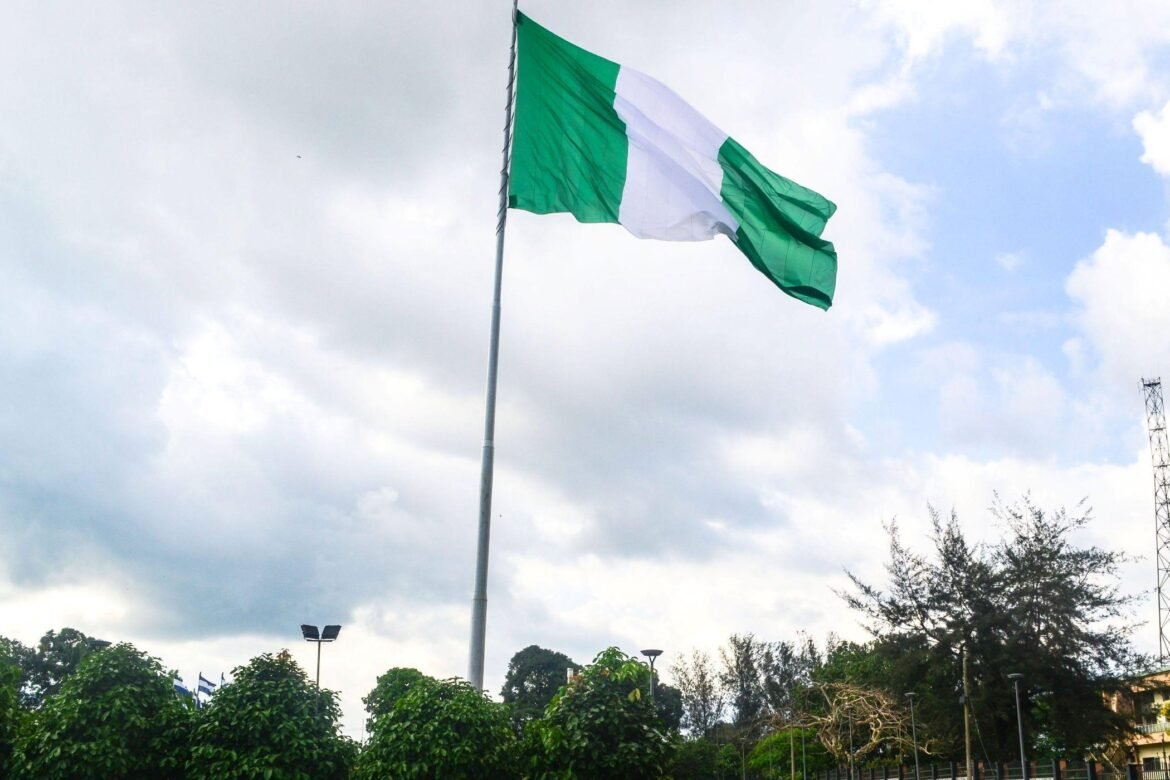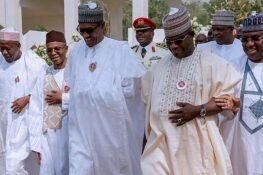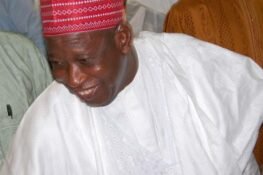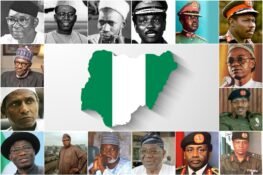A nation is not like humans. Its lifespan is unlimited, unknown and indeterminable.
If Nigeria were human, at 64 years, it would be winding down, in or preparing for retirement.
But even as a nation, crawling like a baby at 64 is unacceptable.
At 64, a republic may still be regarded as young compared to other countries, but 64 is a long, long time to struggle with teething issues of development.
On this 64th Independence Day, humility is needed by all Nigerians to admit that their nation suffers arrested development.
We cannot continue to settle for happy new month greetings on October 1st.
Six decades are sufficient to get little things right in any country – from good roads, to sufficient energy, good public schools, recreational facilities for the kids, good healthcare and streets safe for the kids to play.
The efficiency of basic public services is the lowest common denominator for measuring the well-being of nations, and even developing nations ought to attain this feat within 30 years of independence, not to talk of Nigeria which had been blessed with stupendous oil wealth.
On Nigeria’s Independence Day on October 1, 1960, the new nation was chiseled as Africa’s hope.
The first Prime Minister, Sir Abubakar Tafawa Balewa, boasted as Nigeria was admitted as the 99th member of the United Nations: “But now we have acquired our rightful status, and I feel sure that history will show that the building of our nation proceeded at the wisest pace: it has been thorough, and Nigeria now stands well-built upon firm foundations.”
Influential American magazine, Time, ran a lead story with Balewa on its front page. It wrote: “In the long run, the most important and enduring face of Africa might well prove to be that presented by Nigeria.”
Time beamed: “The Federation of Nigeria stands a giant among Lilliputians; last October, when Nigeria’s 40 million people got their independence, the free population of Black Africa jumped 50%.
Backed by such numbers, Nigeria’s sober voice urging the steady, cautious way to prosperity and national greatness seems destined to exert ever-rising influence in emergent Africa.”
The US President, John F. Kennedy, gushed with infective excitement at what Nigeria brought to the global stage, as he announced all kinds of programs for Nigeria.
“Recognizing as well the need in Africa for rapid educational development, I proposed several months ago the establishment of an African Educational Development Fund, to make available more educational specialists, teachers, and material, and to provide for more university, professional, and other scholarships to Nigerian students and specialists.”
Where expectations are so high, disappointment is far worse. That’s exactly what happened in the case of Nigeria.
Soon as it became independent, cracks emerged, as politicians bickered along ethnic lines, culminating in a bloody military coup six years into freedom.
Nigeria then became a rollercoaster, with ups and downs, twists and turns that produced a nation which today sends its best talents abroad in search of better life.
Apart from the challenges of the civil war, military rule, tribalism, nepotism, corruption and kleptomania tore at Nigeria’s fabric and the hope of delivering a successful country within a few years became a challenge.
Nigeria was not supposed to turn this way. It was hyped to reach the heights that South Korea and Singapore have today attained, or, at the minimum, Botswana – nations that delivered basic happiness to their people.
As Nigeria gained independence, the promise of oil wealth painted a picture of prosperity and rapid development.
The discovery of oil in commercial quantities in 1956 at Oloibiri in the Niger Delta was seen as a blessing.
The 1970s saw a dramatic increase in oil revenues and a surge of optimism and grand plans for transformation, expansion and development.
Unexpected wealth presented Nigeria with unprecedented opportunities.
The government embarked on ambitious infrastructure projects, expanded educational institutions and industrialization programs.
The oil boom fueled dreams of Nigeria becoming an African economic powerhouse, capable of lifting millions out of poverty and positioning it as a global player.
However, the oil blessing soon turned into a curse.
Petroleum wealth led to the neglect of other sectors, particularly in agriculture and mining, which had been the backbone of the economy.
The influx of petrodollars created a false sense of economic security, masking underlying structural weaknesses and fostering a culture of dependency on oil revenues.
People trooped form the villages to the cities in search of contracts and quick wealth. Hard work no longer mattered.
Perhaps the most tragic chapter in Nigeria’s post-independence story is the squandering of its oil riches.
Instead of investing in sustainable development, as Saudi Arabia, Qatar and United Arab Emirates did – building robust institutions and diversifying the economy – successive governments in Nigeria took to reckless spending and monumental corruption.
The oil wealth that should have transformed Nigeria into a model for Africa simply became a curse.
Billions of dollars vanished into foreign bank accounts owned by Nigerian leaders or were spent on ostentatious lifestyles.
Meanwhile, basic infrastructure crumbled, public services deteriorated, and poverty deepened for the majority of Nigerians.
This era of waste was characterized by white elephant projects, and a growing disparity between the elite and the masses.
The promise of oil-driven prosperity turned into a nightmare of resource mismanagement and lost opportunities.
Nigeria had become a nation rich in oil but with poor people.
Soon enough Nigeria became just an oi-producing nation with one of the lowest per capita in the world. The human capital index became unfitting.
The return to democracy in 1999 after years of military dictatorships ushered a new era of possibilities. However, the challenges of nation-building have persisted. Leaders have not lived up to expectations.
Ethnic tensions, religious conflicts, banditry and the rise of insurgency in the North added new dimensions to Nigeria’s struggles.
The country has oscillated between periods of economic growth and recession, political stability and crisis, social progress and regression.
This rollercoaster experience has left many Nigerians disillusioned, questioning the very essence of nationhood.
The dream of a united, prosperous Nigeria seems more elusive than ever, despite the passage of 64 years.
As Nigeria grapples with its current realities, it is natural to wonder about alternative paths.
What if Nigeria had never become independent? What if independence had been delayed or approached differently? These counterfactual scenarios, while speculative, offer interesting perspectives on Nigeria’s journey.
For Nigeria to truly realise its potential, it must address fundamental issues that certainly include strengthening democratic institutions and the rule of law, diversifying the economy from oil, investing in education, healthcare, and public infrastructure, diversity, tackling corruption and fostering a culture of accountability
I have never been able to stop pondering what structure or approach would have worked better.
In my academic, controversial and uncomfortable thought, I often ask: would Nigeria have fared better under continued colonial rule or if it maintained closer ties with England as many Caribbean nations did?
I know – this perspective overlooks the fundamental injustice and exploitation inherent in colonialism.
It also ignores the fact that many of Nigeria’s current challenges have their roots in the colonial era, as properly captured by Walter Rodney in his book, How Europe underdeveloped Africa.
But when one considers that even with their flaws, leaders in the First Republic embarked on transformational projects, especially in Western Nigeria, I assure myself the problem is not that of human capacity and intelligence.
As Nigeria marks its 64th year of independence, we should not just celebrate.
We should reflect and mourn.
The country has faced numerous challenges, missed opportunities, and suffered from poor leadership and mismanagement of resources, although it is a complex and diverse society.
The nation needs to learn from past mistakes, build on successes and chart a new course.
Nigeria’s greatest strength has always been its people – resilient, resourceful, and innovative.
The country’s youth, in particular, represent a tremendous source of potential, driving change in technology, entertainment, and entrepreneurship.
The “Japa” emigration syndrome must be addressed. Exporting talents and dislocating families will not solve the problem in the longer term.
For Nigeria to truly realise its potential, it must address fundamental issues that certainly include strengthening democratic institutions and the rule of law, diversifying the economy from oil, investing in education, healthcare, and public infrastructure, diversity, tackling corruption and fostering a culture of accountability.
The search for true independence – not just political, but economic and social – is critical.
With visionary leadership and active citizenship, Nigeria can still write a success story along the lines of the dreams of 1960.








